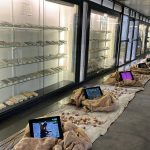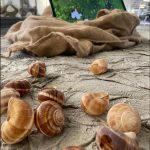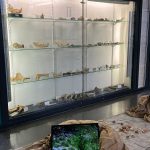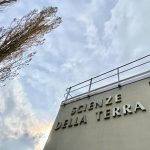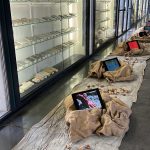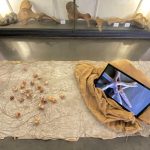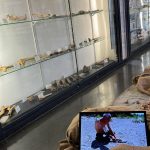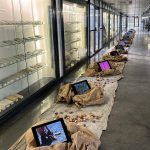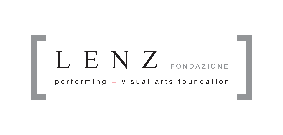
Numbers
Video installation
Museum of Paleontology
Creation | Maria Federica Masters e Francesco Pititto
Musica | Andrew Azzali
Voice over | Marcello Sambati
Lenz's research on sacred texts began with The creation, work inspired by Genesis and contemporary visions on the origin of matter and the Universe, of the infinitely small and the infinitely large of the fundamentals of life, known thus far. Ideally referring to the book of numbers as a fourth book of the Old Testament.
Numbers è una riflessione/azione sull’essere umano al tempo della sua massima crisi e delle sue minime prospettive di sopravvivenza, at the end of a progressive deterioration of its living space, in the current geological era, in which the omeostasis of the ecosystem was compromised. There are several impressive images contained in the chapters, the cloud over the tent of God, the silver trumpets, the red heifer, the bronze serpent, the donkey, the consequences contained in the new laws. Images and situations that configure different affinities with our present, so precarious on principles, on respect for the land, fearful of diversity and more inclined to close themselves off than to open up to the risk of the new.
More information on creation [+]
The prophetic quantity and water
Text by Francesco Pititto
There are several impressive images contained in the chapters: the cloud over the tent of God, the silver trumpets, the red heifer, the bronze serpent, the donkey, the consequences contained in the new laws. Images and situations that configure different affinities with our present, so precarious on principles, on respect for the land, fearful of diversity and more inclined to close themselves off than to open up to the risk of the new.
The two pillars of dramaturgy, But, they address in particular the question of quantity understood as the sum of individuals united by a prophetic mission – between conquest and the promised land – and that of water, vital element to the achievement of divine and human purposes, to the conscious and unconscious representation of this element.
For Jung, water was one metaphor of the unconscious. In the study of symbols connected to depth psychology, extreme importance is attributed to water: it is an element essential to life but does not nourish, it is a fundamental symbol of every unconscious energy and therefore it is also dangerous when it appears to exceed its proper limits (psychosis).
The word majim, "water", resonates beyond 580 times in the Old Testament, like the Greek equivalent hydor it returns about eighty times in the New.
Circa 1.500 ancient verses and beyond 430 of the New Testament are "soaked" with water, because in addition to the words mentioned there is a real constellation of realities that revolve around this very precious element, starting with the dangerous jam, the sea", or by the more domestic Giordano, passing through the rains (with different Jewish names, if autumnal, winter or spring), the sources, the rivers, the torrents, channels, the wells, the tanks, the celestial reservoirs, downpour, the ocean and so on.
Not to mention the verbs related to water such as drinking, water, to be thirsty, quench thirst, deposit, immerse (“baptize” in New Testament Greek), wash, purifying. _ To the thirsty people, who murmurs due to lack of faith, God responds with the miracle of the spring flowing from the rock.
Even the research on the images generated by the writing of Lenz's original text - imagoturgy - and vice versa the verses regenerated from the images mainly refer to water, to his lack, to its power to determine the landscape, including the landscape of humans and non-humans. Then the quantity dried up and narrowed into an individuality, in a solitary being – the only biped in the painting – in a reciprocity of opposites that create a void filled with presence, as if all humanity had imploded into that one living being.
The place given to the image text, to visual dramaturgy, it is a dry beach on the Po, where heat and dryness outline perspective shapes and waves of air that move the contours.
The Poet lives alone in that landscape.
Lenz's Numbers is only ideally referred to the Book of Numbers, the fourth book of the Old Testament. The numbering of beings, the census that lists and names bodies to be recognized, the travelers in the desert as witnesses to the test of pain and redemption are new material for reflection, after Genesis, a new focus on the meaning of contemporary theater and the meaning of representation.
Numbers
Video installation
Dramaturgy, imagoturgy | Francesco Pititto Ideation, installation | Maria Federica Masters Voice over | Marcello Sambati Original music | Andrew Azzali Design care | Elena Sorbi Organization | Ilaria Stocchi Communication and press office | Elisa Barbieri Diffusion | Alessandro Conti Setup care | Alice Scartapacchio, Giulia Mangini, Tiziana Chapel, Photographic documentation | Francesco Pititto, Elisa Morabito Production Lenz Fondazione_Festival Natura Dèi Teatri
Made with the support and collaboration of:
MiC Ministry of Culture, Maeci, Emilia Romagna region, Municipality of Parma, AUSL Parma DAI SM-DP Integrated Mental Health Department for Pathological Addictions, University of Parma, Chiesi Farmaceutica, Monteparma Foundation, Conservatory of Music A. Boito of Parma.







